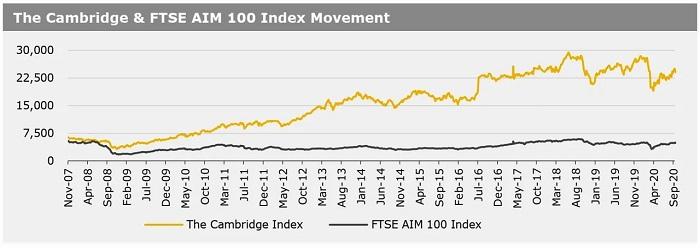Deutsche Bank reiterated its “Hold” rating on Johnson Matthey, down 8.3%, with a target price of 2200p.
Frontier Developments, up 5.5%, announced that RollerCoaster Tycoon 3: Complete Edition, the genre-defining classic amusement park management game, published under the Frontier Foundry games label is now available on Nintendo Switch and PC through Steam and the Epic Games Store.
Cambridge Cognition, up 10.3%, in its unaudited interim results for the six months ended 30 June 2020, stated that its revenues stood at £3.01m, up from £2.17m recorded in the same period of the previous year. Its basic and diluted loss per share came in at 1.5p, compared to 7.7p.
SDI Group, up 5.2%, announced that it has made a very good start to the new financial year.
Bango, up 4.3%, announced that it has entered into separate partnerships with EPIC ON and Evergent.
Amino Technologies, up 3.3%, announced that AminoOS' upcycling technology will enable Colsecor, a leading Argentinian cable cooperative, to launch its new OTT services, SENSA, throughout Argentina.
1Spatial remained unchanged at 31p. The firm announced that it has appointed Liberum Capital Limited as its nominated advisor (NOMAD) and Broker with immediate effect.
GRC International Group, down 8.3%, in its preliminary results for the 12 months ended 31 March 2020, announced that its revenue dropped to £14.15m from £15.85m recorded in the last year.
Oracle Power, down 3.7%, announced that it will publish its 2020 interim accounts by 31 October 2020.
Netcall, down 1.3%, announced the appointment of Canaccord Genuity Limited as its NOMAD and sole broker, with immediate effect.
Checkit, down 1.1%, confirmed that Chief Financial Officer (CFO), Andy Weatherstone resigned from his role and that Aylsa Muir has now been appointed as CFO in his place.
UK markets ended lower last week, amid rising COVID-19 cases worldwide and as investors digested details of the UK Chancellor, Rishi Sunak's new measures to replace the furlough scheme. On the data front, UK industrial orders declined on a monthly basis in September. Also, manufacturing and services PMI dropped in September. The British government borrowed the third highest monthly figure on record in August, as tax revenues fell and as the government spent to deal with the economic effects of the COVID-19 crisis. In contrast, British consumer confidence for September improved to its highest level since March. The FTSE 100 index declined 2.7% to settle at 5842.7, while the FTSE AIM 100 index fell 1.6% to close at 4875.3. Further, the FTSE techMARK 100 index dropped 2.7% to end at 5637.4.
US markets ended mixed in the previous week, amid concerns over the economic outlook in the absence of renewed aid from Washington and as rising COVID-19 infections dampened investor sentiment. However, data showing a surge in the sale of new homes revived faith in economic recovery. Sale of new US single-family homes rose to their highest level in nearly 14 years in August. US durable goods rose for the fourth straight month in August. The manufacturing PMI climbed to a 20-month high in September, whereas services PMI dropped more than expected in the same month. Meanwhile, the nation’s weekly jobless claims unexpectedly advanced in the week ended 18 September, supporting views that the economic recovery from the COVID-19 pandemic was running out of steam amid diminishing government funding. Remarks by Federal Reserve Chairman, Jerome Powell in his Congressional testimony indicated that the central bank is taking a wait-and-see approach. The DJIA index fell 1.7% to end at 27174, while the NASDAQ index gained 1.1% to close at 10913.6.
